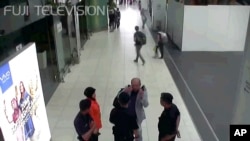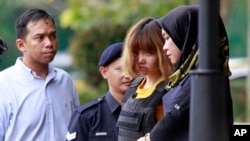The motive for the assassination of the estranged half brother of North Korean leader Kim Jong Un appears to be an attempt to forestall any outside effort to install an alternative to the current leader, a former CIA acting director told VOA this week.
Kim Jong Nam, 45, died February 13 after allegedly being poisoned by two women at Malaysia’s Kuala Lumpur International Airport. The women smeared the VX nerve agent on Kim’s face, according to Malaysian police.
VX is a substance listed as a banned chemical weapon under the 1993 Chemical Weapons Convention.
Kuala Lumpur police have arrested the women and one North Korean national, and are seeking seven other North Koreans, including a diplomat based in Kuala Lumpur, for questioning. While the police have not determined if Pyongyang was behind the assassination, Seoul accused the North Korean leader of ordering the killing of his half brother.
In an interview with VOA, John McLaughlin, who served as acting director of Central Intelligence from July to September 2004 and as the deputy director of Central Intelligence from 2000 to 2004 under President George W. Bush, said North Korea is a likely perpetrator in Kim Jong Nam’s death, given the poison used to kill him.
“It’s very hard for someone not connected to a state entity to obtain the kind of poison that was apparently used,” the former CIA official said.
Potential threat to power
Once deemed heir apparent to his late father, Kim Jong Il, who ruled the country from 1994 to 2011, Kim Jong Nam lived in a de facto exile after falling out of favor with him. When asked what might have motivated the regime to order the killing, McLaughlin said: “The North Korean leadership wanted to make sure there is not an alternative readily available for Kim Jong Un.”
“They particularly would want to make sure that China would not have someone handy that they could install in the event Kim Jong Un was removed or fell from power,” said McLaughlin, who is now with the Johns Hopkins School of Advanced International Studies.
Although the incident has sparked widespread speculation about the stability of the North Korean regime, McLaughlin cautioned against drawing conclusions. However, he said a series of executions carried out by Kim Jong Un could indicate his power might be insecure.
“The pattern of purging is deep enough to suggest that he is still not totally secure in power,” he said.
Alarming event
The assassination drew the world’s attention because it took place at one of the busiest airports in Asia, prompting news media to speculate on why such a public venue was chosen.
McLaughlin, a 30-year veteran of the CIA, said the perpetrator might have thought the airport was the place where the victim was “most vulnerable.”
“It was probably seen as a place where what they were doing would be less easily noticed just from the general turmoil of the airport,” he said.
According to McLaughlin, the incident in Malaysia is an “alarming event” because the banned chemical was used in a public place to kill someone.
“It means that this very unstable regime has a very powerful weapon and was reckless enough to use it in a crowd of people,” he said.
Possible repercussions
China is widely believed to have favored Kim Jong Nam for a leadership position in Pyongyang. The assassination puts Beijing in a difficult position, McLaughlin said.
“I think China faces a bit of dilemma here,” he said. “They don’t want major changes in the [Korean] peninsula, but they also recognize [Kim Jong Un] brings a degree of unpredictability that could shape things in a direction that they would have trouble managing.”
McLaughlin said the United States should relist North Korea as a state of sponsor of terrorism if the communist state is found responsible for the apparent assassination.
The U.S. designated the North as a state of sponsor of terrorism after the country bombed a South Korean airliner in 1987, killing 115 passengers and crew on board. In 2008, the U.S. removed the North from the list as part of a nuclear deal, in which Pyongyang agreed to disable its plutonium plant and allow some inspections.
Following Kim’s death in Kuala Lumpur, some U.S. lawmakers are calling on the Trump administration to repeal the decision.






